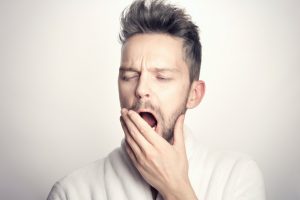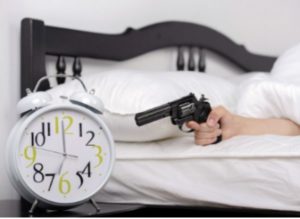Sleep, good sleep, is the most important aspect for achieving and maintaining your weight loss goals.

If you’re not getting decent sleep – you can forget about losing weight.
You can also forget about having a productive workday, a fun social life, a harmonious relationship with your partner and good health.
Sleep really is that important!
There are a number of links between sleep and weight loss.
Here are 5 key factors why not getting enough sleep may be affecting your weight.
- Hormones
There are two hormones that effect our eating patterns. Ghrelin, which promotes hunger and Leptin, which contributes to us feeling full. Research has shown that lack of sleep can play havoc with these hormones, increasing Ghrelin and decreasing Leptin, resulting in us wanting to eat more and not wanting to stop (sound familiar?)
- Metabolism
Our metabolism is responsible for converting food and drink into energy. Research is showing that not getting sufficient sleep can mess with our metabolic rate, leading to metabolic dysregulation which in turn can lead to weight gain, obesity, and Type 2 Diabetes.
- Too tired to exercise
When we’re tired the number of excuses not to exercise can go through the roof – quite often we just can’t be bothered; motivation zero. Ironically, if we do exercise it can help with sleep!
- Affects our food preferences
Linked to the increase in Ghrelin, with a tired mind we go on the search for high energy foods. Back in caveman days this wasn’t such a problem – they didn’t have access to corner shops, garages, and supermarkets! We can get chocolate, crisps, cakes, biscuits – whatever it is we think we need for a ‘pick me up’ – 24/7!
- More waking hours to eat!
Have you woken up in the night and eaten something to ‘help you get back to sleep’? Or stayed up late binge-watching Netflix with a bag of crisps, bowl of cereal etc! And maybe you’re conditioned to have breakfast the minute you wake up? That’s a lot of additional food our fellow ‘good’ sleepers aren’t consuming!
So how much sleep should we be getting?

It’s often stated that 7 hours sleep is the magic number
We’re all different, but it’s certainly around that number.
Between 6 and 8 hours is the gauge. You should feel refreshed when you wake up – now I don’t know anyone who jumps out of bed and shouts ‘Morning World’, but you shouldn’t be pressing that snooze button more than a couple of times!
It’s important to remember that waking in the night is quite normal, it’s just the frequency and the length of time it takes to get back to sleep that can cause problems.
Things to change
- Lay off the technology a good hour before you hit the pillow. Invest in an alarm clock and leave your phone to charge downstairs.
- Move more during the day – if you’re at a desk most of the day, build in time to go for a walk, and one maybe in the evening. Your brain might be tired by the end of the day, but your body might not be. A sleep expert once described this to me as ‘inflating your sleep balloon’, the air in the balloon represents the amount of sleep, the more you do in the day to inflate the balloon, the more air you’ll have in it to deflate overnight. Inflate your balloon!
- Cut out the crap food – if you’re eating highly/ultra-processed food eg chocolate, cakes, biscuits, sugary cereal, ready meals, sausages, these will be affecting your sleep pattern.
- Alcohol – you may think you sleep better after a drop of wine/whisky – you’ll certainly drop off quicker; but the quality of your sleep will be affected. You won’t go through all the cycles of sleep to be truly rested. This in turn will play havoc with those appetite hormones (Ghrelin and Leptin) and impact your eating habits the following day.
- And finally – it is estimated that 1.5 million people in the UK are affected by sleep apnoea and yet 85% are undiagnosed. Sleep apnoea is when you stop breathing frequently when you are asleep and can be very dangerous –
It needs treating.
Your partner may report that you stop breathing when you’re asleep. But also, if you’re getting up for a wee frequently in the night – don’t just put it down to an age thing – oxygen depletion during apnoea episodes stimulates blood flow to the kidneys increasing the need to pee! If you’re up more than once or twice – get it checked out.
Signs of sleep apnoea –
Wake up really thirsty
Wake up with a headache
Sensitive teeth and jaw
So what to do if you think you’re not getting enough sleep?
Start by putting the actions above into place – but while the changes are taking affect…
Don’t lie awake in bed for hours worrying about not getting enough sleep. The advice is, after just 15 minutes – get up and do something, something boring. Fold the washing, clear out a draw, write some Christmas card (you’ll be grateful in December!) after 20 minutes go back to bed and try to sleep again.
Here’s to a good night’s sleep!
For anyone who’d like some help with weight loss – I’m here!
Let’s have a chat – book here for a virtual cuppa. I’ll put the kettle on!

